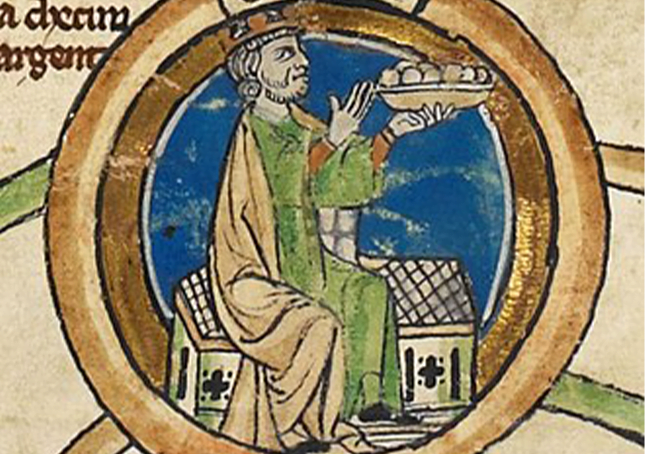Alfred the Great

Alfred the Great (848/9 – 26 October 899) was king of the West Saxons from 871 to c. 886 and king of the Anglo-Saxons from c. 886 to 899. He was the youngest son of King Æthelwulf, who died when Alfred was young. Three of Alfred’s brothers, Æthelbald, Æthelberht and Æthelred, reigned in turn before him.
After ascending the throne, Alfred spent several years fighting Viking invasions. He won a decisive victory in the Battle of Edington in 878 and made an agreement with the Vikings, creating what was known as the Danelaw in the North of England.
Alfred also oversaw the conversion of Viking leader Guthrum to Christianity. He defended his kingdom against the Viking attempt at conquest, becoming the dominant ruler in England. Details of his life are described in a work by 9th-century Welsh scholar and bishop Asser.
Alfred had a reputation as a learned and merciful man of a gracious and level-headed nature who encouraged education, proposing that primary education be conducted in Old English rather than Latin and improving the legal system and military structure and his people’s quality of life. He was given the epithet “the Great” in the 16th century.
In April 871 King Æthelred died and Alfred acceded to the throne of Wessex and the burden of its defence, even though Æthelred left two under-age sons, Æthelhelm and Æthelwold. This was in accordance with the agreement that Æthelred and Alfred had made earlier that year in an assembly at an unidentified place called Swinbeorg. The brothers had agreed that whichever of them outlived the other would inherit the personal property that King Æthelwulf had left jointly to his sons in his will. The deceased’s sons would receive only whatever property and riches their father had settled upon them and whatever additional lands their uncle had acquired. The unstated premise was that the surviving brother would be king. Given the Danish invasion and the youth of his nephews, Alfred’s accession probably went uncontested.
While he was busy with the burial ceremonies for his brother, the Danes defeated the Saxon army in his absence at an unnamed spot and then again in his presence at Wilton in May. The defeat at Wilton smashed any remaining hope that Alfred could drive the invaders from his kingdom. Alfred was forced instead to make peace with them. Although the terms of the peace are not recorded, Bishop Asser wrote that the pagans agreed to vacate the realm and made good their promise.
The Viking army withdrew from Reading in the autumn of 871 to take up winter quarters in Mercian London. Although not mentioned by Asser or by the Anglo-Saxon Chronicle, Alfred probably paid the Vikings cash to leave, much as the Mercians were to do in the following year.
Hoards dating to the Viking occupation of London in 871/872 have been excavated at Croydon, Gravesend and Waterloo Bridge. These finds hint at the cost involved in making peace with the Vikings. For the next five years, the Danes occupied other parts of England.
